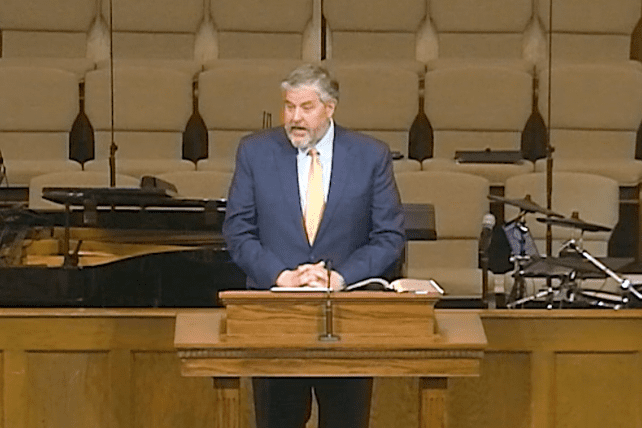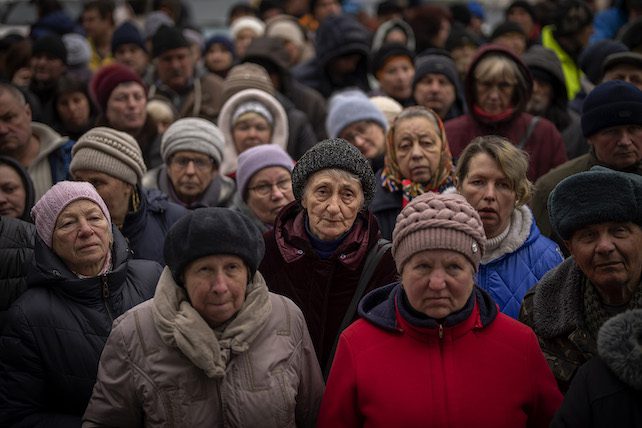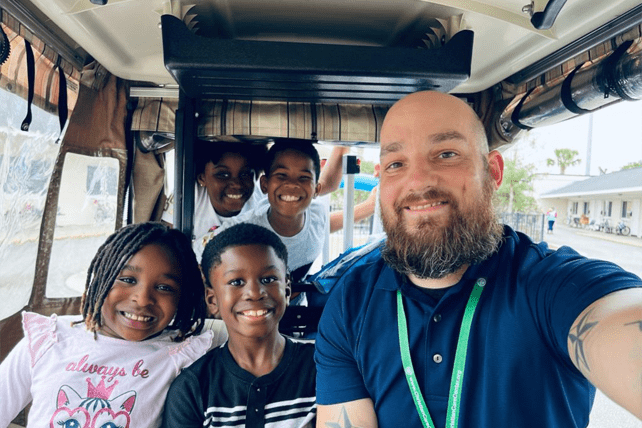There is a lot of faultfinding in the world these days. The problem with the world, it seems, is other people. Many have given up loving one another for the sake of “othering” one another instead.
It starts in our hearts. We have our list of concerns, the echo chambers we are part of, and our ideological tribes that bring us “together” in condemnation of a common enemy. When outrage becomes our norm, we lose focus on the matter of ultimate concern — namely, organizing our lives around the agenda of Jesus as opposed to fixating on how “the other” is failing to do so.
What is the agenda of Jesus? That we love God with our whole selves and our neighbor as ourselves.
Who is our neighbor? Jesus said we must start with our ideological and political enemies to find the answer to this question. A Jew and a Samaritan in the same story, where one is helpless and “the other” comes to his aid. Ideological differences are put aside in deference to human dignity. Culture wars are laid to rest in deference to loving neighbor as self. End of story. Now go and do likewise.
Whenever we de-center neighbor love as Jesus defined it (again, think Samaritans serving Jews) we also de-center him as our Lord. As we do so, we declare our opposition to the only Kingdom inside of which cultural enemies can learn to love one another. Consider, for example, how Matthew the tax collector and Simon the anti-taxation zealot were both among Jesus’ twelve disciples. They lived and died together while ministering together, as brothers. Incidentally, they were also both sharply rebuked by Jesus for wanting to call fire down on a Samaritan village (see Luke 9).
In 21st century America, we fancy calling down fire on other people. When we do, we become disciples of another kind as we turn partisanship into our new doctrine, pundits into our new prophets, and politicians into our new Jesus. This happens on both sides of the aisle. It happens when we are glad about who is in power and when we are not. This unholy trinity is failing us as a society and, wherever it gains a foothold, as the Body of Christ. Our Christian “will to love” gets usurped by a Christ-less “will to power,” proving Nietzsche’s theory that when we fixate on gaining power over our ideological enemies more than we fixate on loving our ideological enemies, God becomes functionally dead to us.
We remain, in Christ, one Body with many members. But fixing our eyes on Washington instead of Jesus will lead us to dis-member one another over time. The solid ground of our fellowship through union with Christ will become like eggshells under our feet. We will bite and devour, shame and cancel, attack and un-friend…and Jesus will lose visibility in our midst.
The solution is to repent and reverse course by renouncing the unholy trinity (partisanship, pundits, and politicians as our preferred doctrine, prophets, and saviors) because the Kingdom of our Jesus is decidedly not of this world.
Neither progressivism nor conservatism, neither activism nor pacifism, neither moral outrage nor moral restraint, neither wokeness nor anti-wokeness, neither favorite pundits nor favorite preachers, count for anything. What counts is faith expressing itself through love.
As Shakespeare reminds us, the fault is not in our stars but in ourselves.
Chesterton was allegedly asked, “What’s wrong with the world.” His answer? “I am.”
Can we start there? None of us can boast of having the moral high ground. This is why we all need Jesus, and sorely so. We are his chosen people, not his choice people.
May we grieve the logs in our own eyes more than we grieve the specks in other people’s eyes. Only then will we have moral authority to speak meaningfully and persuasively to the specks that are elsewhere. Only then will we cease to be fruitless, clanging cymbals. May we get back to Matthew 18 (when we’ve been wronged) and Mark 5 (when we’ve done wrong) as our strategy for engaging conflict. Lastly, may we cease behaving as if Washington is the nexus for the Kingdom of God. It is not.
Hopefully, the following thoughts will provide helpful guidance for how to get started.
Culture-weary, but still hopeful in Christ,
Scott
Once in a sermon, the great Baptist preacher, Charles Haddon Spurgeon, spoke strongly against owning slaves. In that sermon, he said about the emancipator William Wilberforce:
“Not so very long ago our nation tolerated slavery in our colonies. Philanthropists endeavored to destroy slavery; but when was it utterly abolished? It was when Wilberforce roused the church of God, and when the church of God addressed herself to the conflict, then she tore the evil thing to pieces. I have been amused with what Wilberforce said the day after they passed the Act of Emancipation. He merrily said to a friend when it was all done, ‘Is there not something else we can abolish?’ That was said playfully, but it shows the spirit of the church of God. She lives in conflict and victory; her mission is to destroy everything that is bad in the land. “(The Best Warcry, March 4, 1883)
Another great British thinker, CS Lewis, said that Christianity, too, is a fighting religion. Just as Jesus loved the world by combatting evil in the world, his followers will do the same. Advancing the good includes “picking fights” with everything that threatens and diminishes the good.
But before we are ready to fight the wrong out there…
The Fault In Ourselves
In Julius Caesar, Shakespeare’s Cassius says, “The fault, dear Brutus, is not in our stars, but in ourselves.” It is easy to look around and identify things that are wrong with the world and with others. But Jesus directs us to look first at ourselves. Before we can effectively address the fault in our stars, we must face the fault in ourselves.
“Why do you see the speck that is in your brother’s eye, but do not notice the log that is in your own eye? Or how can you say to your brother, ‘Let me take the speck out of your eye,’ when there is the log in your own eye? You hypocrite, first take the log out of your own eye, and then you will see clearly to take the speck out of your brother’s eye.” (Matthew 7:3-5)
Scripture highlights a universal truth about the human condition: None of us is what we should be. Whether a short temper, a lustful eye, a haughty heart, a lying tongue, or some combination of these and other issues, each of us lives with a sickness of the soul – a sickness that keeps us from loving God as we are meant to love him.
When the body is sick, we who desire health will attack the sickness in multiple ways. We take our medicine, do our exercises, get plenty of rest, eat healthy, and whatever else the medical professionals tell us we must do. Similarly, sickness of the soul requires focus, energy, and action. It also requires honesty about the seriousness of our condition. The soul that is not carefully tended to—the soul whose health is not consistently fought for—will erode spiritually, emotionally, relationally, and in every other way. This is why the fight against the wrong in us is a most important and necessary fight. Emotionally intelligent and spiritually healthy people answer the question, “What’s wrong with the world?” in the same way that Chesterton is said to have answered the same:
“I am.”
Our love for God is diminished wherever we are willing to dismiss or disobey him. And when we dismiss or disobey God, we don’t merely go against him; we also go against ourselves…because our enjoyment of his love – of that love we can never lose because no one, not even ourselves, is able to snatch us out of his hands (John 10:28) – is intimately connected to our enjoyment of his law.
To see the law of Christ fulfilled,
to hear his pardoning voice
turns a slave into a child
and duty into choice.
Jesus said, “If you love me, you will keep my commandments…I will not leave you as orphans; I will come to you…And he who loves me will be loved by my Father, and I will love him and manifest myself to him…If anyone loves me, he will keep my word, and my Father will love him, and we will come to him and make our home with him. Whoever does not love me does not keep my words…Peace I leave with you; my peace I give to you…Let not your hearts be troubled, neither let them be afraid.” (John 14:15-27)
Boundaries > Dysfunction
Jesus has not left us as orphans. He has come to us, he has come for us…and his love can never be taken from us once we have received it through faith in Jesus. As my long-time friend and gospel sage Scotty Smith likes to say, “God cannot love us more, and he will not love us less.” But as in any romantic relationship, the enjoyment and full manifestation of God’s love will happen in a setting of mutual surrender. In Jesus, God has fully surrendered himself to our deepest need – the need to be forgiven, loved, restored, and made new. And when our heart’s cry becomes, “LORD, your wish is our command,” these truths about his love become more than truths – they also become experiential.
Imagine a loving wife who, after discovering that her husband is seeing another woman, begins to withhold intimacy from him. She simply cannot live with an arrangement in which she shares her husband’s affections with another.
The husband, not wanting to lose the benefits of having her as his wife—for he still enjoys her company, is attracted to her, and enjoys having access to her trust fund—begs her to reconsider. He reminds her of the flowers he has given to her, of the weekly date night that he has never missed, and of how often he affirms her with his words. Every now and again, he will even pull out a guitar and sing a love song to her.
The husband reasons with her, “The other woman only gets 10% of me and you get 90%. Doesn’t that count for something? Isn’t 90% enough for you? Why would you withhold the experience of your warmth, affection and smile from me when I’m 90% committed to you?”
Because she is a healthy wife and not dysfunctional, she calmly responds, “When you give 90% to me and 10% to her, do you know what that makes you? It makes you 100% unfaithful. If you’re not going to give me all of you—if you are bent on keeping a girl on the side, and have no intention to fight against that urge—then I have no choice but to withhold intimacy, to withhold the invitation, “This is my body, given for you…” from you. Integrity to our covenant demands that I not share my bed or warm affection with you under these conditions. When your lips are close to me but your heart is far from me, when you share a bed with a mistress with no intent to turn from her and toward me, I have to keep my distance. This is for your sake as well as mine.”
“It’s Not You…It’s Me”
In times when God seems distant, when I struggle to connect with him, when I find my heart wanting to avoid him – it is sometimes helpful to ask myself (and also the people around me), “Am I actually chasing a mistress? Is there something or someone – other than Jesus – that has me around the neck, that has become my true north and my controlling center, my deeper desire and passion, the functional love of my life? Is there a ‘must have,’ an obsession or an addiction – whether physiological or emotional – the applause of others…the urge to eat, or shop, or monitor social media, or make money, or control things excessively…the urge to gossip and complain and tear down instead of building up…might there be a cause / effect relationship between one or more of these things and my spiritual malaise? Might it be because I remain unmoved by, passive about, and are unwilling to fight against, a known fault that is in myself?”
Sometimes these are questions worth considering. Because as it says in Proverbs 7, all forms of adultery – physical, emotional and spiritual – rob God of the affection owed solely to him, and rob me of surrender’s joy.
“Be attentive to the words of my mouth. Let not your heart turn aside to her ways; do not stray into her paths, for many a victim has she laid low, and all her slain are a mighty throng. Her house is the way to Sheol, going down to the chambers of death.” (Proverbs 7:24-27)
Conversely, falling into the arms of God is the path of life and fullness:
“You make known to me the path of life; in your presence there is fullness of joy; at your right hand are pleasures forevermore.” (Psalm 16:11)
Because God put Jesus away on the cross, he will never put us away.
Isn’t this enough reason to set our hearts on “forsaking all others” – to the end that his wish becomes our command, and his face becomes more compelling to us than his hand?
This fight against the fault in ourselves…it’s a worthwhile fight.
This article originally appeared here.























